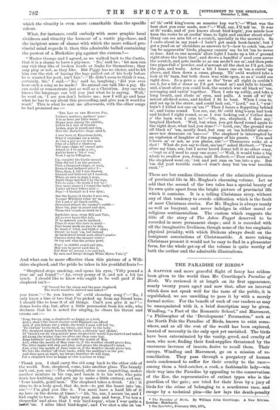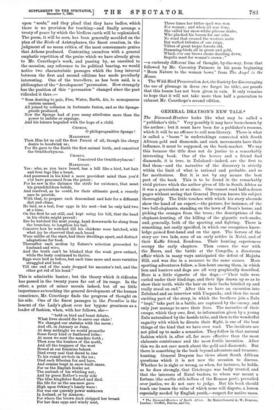THE PARADISE OF BIRDS.*
A HAPPIER and more graceful flight of fancy has seldom been given to the world than Mr. Courthope's Paradise of Birds. We reviewed it at length on its first appearance, nearly twenty years ago,t and now that, after an interval which does not speak well for the taste of the public, it is republished, we are unwilling to pass it by with a merely formal notice. For the benefit of such of our readers as may be unacquainted with it, a brief description may be given. Windbag, "a Poet of the Romantic School," and Maresnest, "a Philosopher of the 'Development ' Persuasion," seek at the North Pole the Paradise of Birds, known to exist some- where, and as all the rest of the world has been explored, located of necessity in the only spot yet unvisited. The birds have been exterminated by the vanity, greed, and cruelty of men, who now, finding their food-supplies threatened by the enormous increase of insects, desire to recall them. Their envoys, Windbag and Maresnest, go on a mission of re- conciliation. They pass through a purgatory of human souls condemned to suffer for their cruelty to the race— among them a bird-catcher, a cook, a fashionable lady—win their way into the Paradise by appealing to the conservatism of the Roc, the representative of extinct types who is the guardian of the gate ; are tried for their lives by a jury of birds for the crime of belonging to a murderous race, and escape' by a technical plea—the law lays the death-penalty
• The Paradise of Birds. By William John Courthope. A New Edition. London : Hatchards. t See Spectator, February 18th, 1871.
upon "souls," and they plead that they have bodies, which there is no provision for touching—and finally arrange a treaty of peace by which the birdless earth will be replenished. The poem, it will be seen, has been generally moulded on the plan of the Birds of Aristophanes, the finest creation, in the judgment of no mean critics, of the most consummate genius that Athens produced. Contenting ourselves with a general emphatic repetition of the praise which we have already given to Mr. Courthope's work, and passing by, as unsuited to the occasion, any reference to its political bearing, we would notice two characteristic passages which the long interval between the first and second editions has made peculiarly interesting. One of the travellers, as has been said, is a philosopher of the " development "persuasion. How strangely has the position of this " persuasion" changed since the poet ridiculed it thus :-
" Soon desiring to pair, Fire, Water, Earth, Air, to monogamous custom unused, All joined by collusion in fortunate fusion, and so the Sponge- puzzle produced.
Now the Sponge had of yore many attributes more than the power to imbibe or expunge, And his leisure beguiled with the hope of a child.
Cnonus.
0 philoprogenitive Sponge !
MAItESNEST.
Then Him let us call the first Parent of all, though the clergy desire to hoodwink us ; For He gave to the Earth the first animal birth, and conceived the Ornithorhyncus. Cnoirus.
Conceived the Ornithoryhncus !
MARESNEST.
Yes: who, as you have heard, has a bill like a bird, but hair and four legs like a beast,
And possessed in his kind a more provident mind than you'd e'er have presumed from the priest : For he saw in the distance the strife for existence, that must his grandchildren betide, And resolved, as he could, for their ultimate good, a remedy sure to provide.
With that, to prepare each descendant and heir for a different diet and clime, He laid, as a test, four eggs in his nest —but he only laid two at a time.
On the first he sat still, and kept using his bill, that the head in his chicks might prevail : Ere he hatched the next young, head downwards he slung from the branches, to lengthen his tail.
Conceive how he watched till his chickens were hatched, with what joy he observed that each brood
Were unlike at the start, had their dwellings apart, and distinct adaptations for food.
Thereafter each section by Nature's selection proceeded to husband and wive, And the truth can't be blinked that the weak grew extinct, while the lusty continued to thrive.
Eggs were laid as before, but each time more and more varieties struggled and bred, Till one end of the scale dropped his ancestor's tail, and the other got rid of his head."
This is admirable banter; but the theory which it ridicules has passed in the twenty years far out of its range. In the other, a point of minor morals indeed, but of no little importance as touching the general development of the human conscience, Mr. Courthope finds the progress of thought on his side. One of the finest passages in the Paradise is the lament of the Lady's ghost over her bygone greatness as a leader of fashion, when, with her fellows, she-
" held on bird and beast debate,
What lives should die to serve our state !
We changed our statutes with the moon ; And oft, in January or June, At deep midnight we would proscribe Some furry kind or feathered tribe : At morn we sent the mandate forth ; Then rose the hunters of the north, And all the trappers of the west Bowed at our feminine behest.
Died every seal that dared to rise
To his round air-hole in the ice ; Died each Siberian fox and hare, And ermine trapt in snow-built snare. For us the English fowler set
The ambush of his whirling net; And by green Bother's reedy side The blue kingfisher flashed and died.
His life for us the sea-mew gave High upon Orkney's lonely wave : Nor was our queenly power unknown In Iceland, or by Amazon;
For where the brown duck stripped her breast
For her dear eggs and windy nest,
Three times her bitter spoil was won For woman ; and when all was done, She called her snow-white piteous drake, Who plucked his bosom for our sake. No wind that crossed the western main But wafted tributes of our reign, Tithes of great tropic forests old, Humming-birds all in green and gold, Which o'er our brows shone dazzling down, Regalia meet for woman's crown :"
—a curiously different line of thought, by-the-way, from that followed by Mr. Coventry Patmore in his poem beginning " Boon Nature to the woman bows," from The Angel in the House.
The Wild-Bird Preservation Act, the Society for discouraging the use of plumage in dress (we forget its title), are proofs that this lesson has not been given in vain. It only remains to hope that it will not take more than half a generation to exhaust Mr. Courthope's second edition.























































 Previous page
Previous page